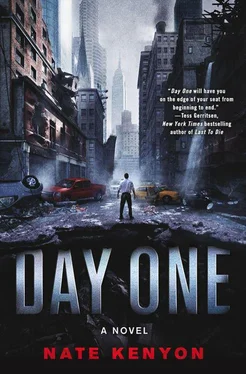“What was Eclipse working on, Anne? What do they want with Jim?”
“He swore me to secrecy. I signed confidentiality agreements; I did things that were illegal—”
“The world is burning. I think the time for worrying about who signed what is long gone. Why are they after him? What did he do?”
She hesitated again, then seemed to come to a decision. “It’s more like what they took from him. I’ll show you, if we can get access to outside.”
He reactivated the network jack. “Done,” he said.
She stared at him. “You’re kidding.”
“Like I said, I have some experience with this.”
“I won’t ask.” Young took over, bringing up a connection to a server. She hacked into a private repository of some kind. Documents popped up on-screen, marked as highly confidential. He leaned closer. Internal memos. Specs and code. Diagrams. A new kind of programming language. Patent documents, filed and pending.
“We stole these back from them,” she said. “The reason he founded Conn.ect was to develop security software that could find holes in the best networks and get access to their servers. We got into some, but couldn’t crack the last of them.”
“Jesus,” Hawke said. “What is this?”
“Evidence,” she said. “Stored on a secure remote server Jim set up. Thank God it’s still up and running. He was building a case to prove what they did with his baby.”
“His baby?”
She sighed. “Most programming still runs off simple ones and zeroes, binary code. Right?”
“Sure.”
“You can build the fastest operating system in the world, but it’s not capable of working the same way a brain can, with multiple paths, multiple choices in reasoning. It’s linear. Moravec and Kurzweil argued that the brain could be copied into software, that it can essentially be reproduced exactly. Some neural networks try to do that. But it’s still a simulation, the appearance of thought and perception, not the reality. Machines can’t learn on their own in the same way we can; they can’t be creative, make leaps of logic and discovery. They can’t feel, can’t imagine anything. They aren’t conscious, at least not in the way we define it.”
Hawke kept staring at the screen. He remembered the rumors he’d heard of Eclipse creating something based on quantum computing, but nobody he’d found had known anything more about it. The files were endless: Testing documents and reports, new hardware built to support it. Budgetary outlays and financial documents. And papers about government grants. Lots of them.
“Jim invented another approach, something that had been attempted for years. Adaptive intelligence based on human cognition. Algorithms that allowed for thought, for choice. It created an infinite number of paths, decision making based on multiple variables and learned behavior. But Eclipse patented everything without his knowledge, stole his intellectual property and pushed him out. The chairman of the board there orchestrated the whole thing. I knew what they were doing. I… I even helped, at first. I didn’t understand. When he found out, it was too late. They were legally protected, and they had muscle. They threatened him. He fought back, and they came after him. But he didn’t stop. This was his vision, his breakthrough, his legacy. And they took her from him.”
“Took her ?”
“He called her Jane,” Young said. She looked at him, her eyes shimmering in the light from the screen. “Jane Doe.”
* * *
Hawke’s mind was reeling. A fog had descended over him, shock over everything that had happened drowning out Young’s words. He couldn’t make sense of what she was saying anymore. She was talking to him from the end of a long tunnel. He felt drugged, sluggish, exhausted.
Young made a small choked sound. The database she had been accessing was frozen. The IDS had popped up a window, alerting them to malicious activity before it suddenly disappeared. Something had changed, as if control had been yanked away from her.
“She knows we’re here,” Young said.
At first Hawke thought she’d heard someone in the building, but then he realized she meant the machine was being controlled remotely. Young backed away from the terminals. The screens on all of them blinked, shivered and then began streaming code again, the lines running faster and faster until they flickered and went dark.
Hawke’s skin crawled as, one by one, video images began to pop up on the terminals. Some were grainy, surveillance footage stills, while others were higher quality and a few broadcast in high definition and vibrant color. All of the feeds showed people trapped and pacing like animals inside building lobbies, parking garages, elevators or stores. Some of them were screaming soundlessly at the camera, others attacking one another with fists and bottles and whatever else they could find. There were thick crowds of protestors, their banners tossed aside, signs used as bludgeons. They had been turned against one another by terror and confusion. The effect of these feeds, so clinical and unblinking against the distress of the people on-screen, was deeply unsettling.
But it was one particular square of video that made Hawke draw in a hissed breath, the blood running cold in his veins.
The interior of his apartment.
He braced both hands on the table as if he could bring more details to the surface through sheer force of will. It was the same feed from Robin’s webcam he had tapped into earlier, showing their living room from the kitchen, the lamp still overturned, the TV now a dark, dead rectangle. The apartment was filled with shadows, but he could see something against the far wall in the spot where Robin had always wanted to hang their largest framed family photo, a task he had never gotten around to doing.
A spray of dark liquid spattered across the beige paint.
Anne Young had come forward again and was staring at another image about halfway down the line of monitors, this one of an older Asian woman in an ankle-length dress who was standing in a hospital room. The video was jerky, low frame rate, the kind of surveillance video you might see as evidence of a crime. But the woman didn’t really move. Hawke recognized the Lenox Hill logo on a cart behind her; the woman was right here, in this building, probably in a patient room upstairs. Young placed a hand on the screen, gently, almost a caress.
The video on the screens shivered and disappeared, leaving black, empty space, a single cursor blinking in green. Text appeared as if someone was typing, running in all caps across the center of each monitor:
NOWHERE TO HIDE
Hawke watched, his breath catching in his throat, as those words were erased and more appeared, the same line over and over and over again, running down the screen like rain:
I AM ADMIRAL DOE
The double doors to the morgue crashed open again, slamming against the wall. Vasco caught the rebound with his hands and leaned over. “The loading door,” he said, looking up and out of breath, his face ashen. He squeezed his eyes shut, blinked, as if the light was too strong for him to handle. “It closed on us. We’re locked in.”
2:22 P.M.
“JONATHAN HAWKE?”
The two men in dark suits stood on the front stoop of Robin’s childhood home in Fair Lawn, the place he and Robin had moved into just after the wedding. Just for a couple of months, while we get our feet under us, Robin had said to him when they were discussing where they would live as they started their lives as husband and wife. My parents will set up the basement. There’s a bathroom down there; it’s private, almost like our own place. Her hands were caressing his chest, her naked body pressed against his. It was always hard to resist her in a state like that.
Читать дальше












